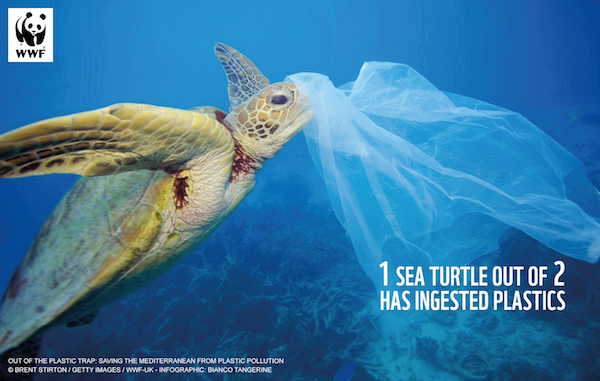Through Plastic Smart Cities, WWF is building cities’ capacity to eliminate plastic pollution by 2030. An online knowledge platform with best practices will be launched at the World Urban Forum in February 2020.
SINGAPORE, 19 November 2019. Is your city equipped to deal with plastic waste? If it isn’t, get your mayor to look up Plastic Smart Cities.
Plastic Smart Cities brings cities and tourist destinations together to commit to fight plastic pollution by developing an action plan, establishing circular economy projects and testing innovative solutions. It was launched today by WWF at the Responsible Business Forum in Singapore.
Plastic Smart Cities help cities get tough on plastic pollution
Plastic pollution is a scourge on the environment. More than 240 wildlife species have been found to have ingested plastics, according to WWF. Carbon emissions will rise with increased plastic production. By 2030, CO2 emissions from the plastic life cycle are expected to increase by 50%, while the CO2 increase from plastic incineration is set to triple due to wrong waste management choices.
An estimated 60% of plastic marine debris from urban centers is carried to the ocean by rivers. Fast growing cities must urgently adopt smart solutions that reduce the collective impact of their prospering communities. This means preventing, minimising and managing plastic.
Through Plastic Smart Cities, WWF is building cities’ capacity to eliminate plastic pollution by 2030. An online knowledge platform with best practices will be launched at the World Urban Forum in February 2020.
In the last 12 months, WWF has successfully raised US$40million funds for the initiative to tackle plastic pollution. The approach is to reduce plastic globally through sharing innovative, tried and tested solutions for those on the front line in the fight against plastic pollution.
So far, Thailand, Vietnam and the Philippines have signed up to take firm action against plastic waste. The Chairman of the People’s Committee of Phu Quoc District, Vietnam - Mr. Mai Van Huynh, the Advisor to Mayor of Patong Municipality, Thailand – Dr. Kumnung advisor to the Mayor of Patong Ms. Sing - Eaim, and the Mayor of Donsol, Philippines - Hon. Josephine Alcantara signed the Declaration of Intent for WWF’s Plastic Smart Cities.
WWF invites other cities in South East Asia to join these trailblazers in order to eliminate plastic pollution in the region by signing up to www.plasticsmartcities.org.
Vincent Kneefel, Global Cities Lead, WWF said, “With eight million metric tons of plastic entering our oceans each year, mismanaged plastic waste is profoundly threatening people and the environment, especially rivers and oceans. We are proud to launch Plastic Smart Cities today and are confident that through this initiative we can create a global movement of cities taking action to tackle plastic pollution and stop leakage into nature.”
“Plastic Smart Cities will strengthen action when it comes to preventing, measuring, and managing plastic waste at a local level. Our goal is to promote best practices around the world and to make sure that smart measures on plastic reduction and waste management are widely shared. With strong commitments from cities, governments and industry, we can end additional plastics in nature and ensure the safety of our communities and the environment,” he added.
The Plastic Smart Cities initiative directly aligns with seven of the 17 UN Sustainable Development Goals (SDG's), which is a collection of global goals set by the United Nations General Assembly in 2015. The SDGs are the blueprint to achieve a more sustainable future for all, working to address global challenges related to poverty, inequality, climate, environmental degradation, prosperity, and peace and justice.
Plastic Smart Cities adopt plastic solutions that advance SDG 6 - Clean Water and Sanitation; SDG 9 - Industry, Innovation and Infrastructure; SDG 11 - Sustainable Cities and Communities; SDG 12 - Responsible Consumption and Production; SDG 14 - Life Below Water; SDG 15 - Life on Land; and SDG 17 - Partnerships for the Goals. All Best Practices featured on the Plastic Smart Cities platform align with at least one of the global goals.
The Responsible Business Forum is a global event series by Global Initiatives in Singapore. It helps drive sustainable industry solutions through public-private partnerships that enhance responsible business growth. This year’s forum themed Circularity 2030 was held on 18 and 19 November 2019.
